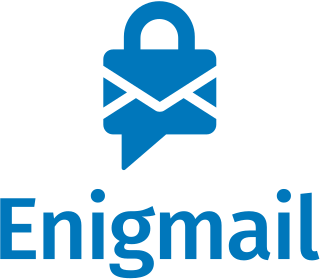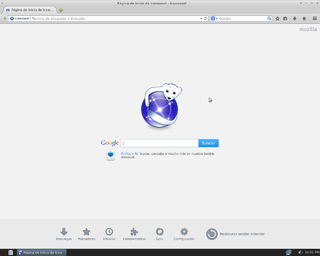Gecko is a browser engine developed by Mozilla. It is used in the Firefox browser, the Thunderbird email client, and many other projects.
XUL, which stands for XML User Interface Language, is a user interface markup language developed by Mozilla. XUL is an XML dialect for writing graphical user interfaces, enabling developers to write user interface elements in a manner similar to web pages.

SpiderMonkey is an open-source JavaScript and WebAssembly engine by the Mozilla Foundation. The engine powers the Firefox web browser and has used multiple generations of JavaScript just-in-time (JIT) compilers, including TraceMonkey, JägerMonkey, IonMonkey, and the current WarpMonkey.

Mozilla Firefox is a free and open source web browser developed by the Mozilla Foundation and its subsidiary, the Mozilla Corporation. It uses the Gecko rendering engine to display web pages, which implements current and anticipated web standards. Firefox is available for Windows 10 and later versions of Windows, macOS, and Linux. Its unofficial ports are available for various Unix and Unix-like operating systems, including FreeBSD, OpenBSD, NetBSD, and other operating systems, such as reactOS. Firefox is also available for Android and iOS. However, as with all other iOS web browsers, the iOS version uses the WebKit layout engine instead of Gecko due to platform requirements. An optimized version is also available on the Amazon Fire TV as one of the two main browsers available with Amazon's Silk Browser.

Mozilla Thunderbird is a free and open-source email client that also functions as a personal information manager with a calendar and contactbook, as well as an RSS feed reader, chat client (IRC/XMPP/Matrix), and news client. Operated by MZLA Technologies Corporation, a subsidiary of the Mozilla Foundation, Thunderbird is an independent, community-driven project that is managed and overseen by the Thunderbird Council, which is elected by the Thunderbird community. As a cross-platform application, Thunderbird is available for Windows, macOS, FreeBSD, Android, and Linux. The project strategy was originally modeled after that of Mozilla's Firefox, and Thunderbird is an interface built on top of that Web browser.
MozillaZine is a discontinued unofficial Mozilla website that provided information about Mozilla products including Firefox browser, Thunderbird email client, and related software. The site used to host an active community support internet forum, and a community-driven knowledge base of information about Mozilla products, but as of 2019 the site was not being maintained anymore. The site is still online in read-only mode.

Enigmail is a data encryption and decryption extension for Mozilla Thunderbird and the Postbox that provides OpenPGP public key e-mail encryption and signing. Enigmail works under Microsoft Windows, Unix-like, and Mac OS X operating systems. Enigmail can operate with other mail clients compatible with PGP/MIME and inline PGP such as: Microsoft Outlook with Gpg4win package installed, Gnome Evolution, KMail, Claws Mail, Gnus, Mutt. Its cryptographic functionality is handled by GNU Privacy Guard.

Mozilla Sunbird is a discontinued free and open-source, cross-platform calendar application that was developed by the Mozilla Foundation, Sun Microsystems and many volunteers. Mozilla Sunbird was described as "a cross platform standalone calendar application based on Mozilla's XUL user interface language". Announced in July 2003, Sunbird was a standalone version of the Mozilla Calendar Project.
XPInstall is a technology used by the Mozilla Application Suite, SeaMonkey, Mozilla Firefox, Mozilla Thunderbird and other XUL-based applications for installing Mozilla extensions that add functionality to the main application.

SeaMonkey is a free and open-source Internet suite. It is the continuation of the former Mozilla Application Suite, based on the same source code, which itself grew out of Netscape Communicator and formed the base of Netscape 6 and Netscape 7.
Kolab is a free and open source groupware suite. It consists of the Kolab server and a wide variety of Kolab clients, including KDE PIM-Suite Kontact, Roundcube web frontend, Mozilla Thunderbird and Mozilla Lightning with SyncKolab extension and Microsoft Outlook with proprietary Kolab-Connector PlugIns.
Add-on is the Mozilla term for software modules that can be added to the Firefox web browser and related applications. Mozilla hosts them on its official add-on website.

In 2006, a branding issue developed when Mike Connor, representing the Mozilla Corporation, requested that the Debian Project comply with Mozilla standards for use of the Thunderbird trademark when redistributing the Thunderbird software. At issue were modifications not approved by the Mozilla Foundation, when the name for the software remained the same.

The Mozilla Calendar Project was the name for the Mozilla project that led to the development of Sunbird calendar application and the Lightning integrated calendar. Sunbird and Lightning are both free software, released under the Mozilla tri-license: the Mozilla Public License, the GNU General Public License and the GNU Lesser General Public License.

GNU IceCat, formerly known as GNU IceWeasel, is a completely free version of the Mozilla Firefox web browser distributed by the GNU Project. It is compatible with Linux, Windows, Android and macOS.

Stylish is a user style manager that can change the appearance of web pages in a user's browser without changing their content by including user-supplied CSS style sheets with those supplied by the web site itself. The Stylish browser extension includes tools with which to write user styles, and can install user styles written by other Stylish users from a companion website. These user styles may be more or less selective, targeting just one web page, or all of the pages on a domain, or every page on the web.
Content Security Policy (CSP) is a computer security standard introduced to prevent cross-site scripting (XSS), clickjacking and other code injection attacks resulting from execution of malicious content in the trusted web page context. It is a Candidate Recommendation of the W3C working group on Web Application Security, widely supported by modern web browsers. CSP provides a standard method for website owners to declare approved origins of content that browsers should be allowed to load on that website—covered types are JavaScript, CSS, HTML frames, web workers, fonts, images, embeddable objects such as Java applets, ActiveX, audio and video files, and other HTML5 features.
Mozilla is a free software community founded in 1998 by members of Netscape. The Mozilla community uses, develops, publishes and supports Mozilla products, thereby promoting exclusively free software and open standards, with only minor exceptions. The community is supported institutionally by the non-profit Mozilla Foundation and its tax-paying subsidiary, the Mozilla Corporation.

PDF.js is a JavaScript library that renders Portable Document Format (PDF) files using the web standards-compliant HTML5 Canvas. The project is led by the Mozilla Corporation after Andreas Gal launched it in 2011.









